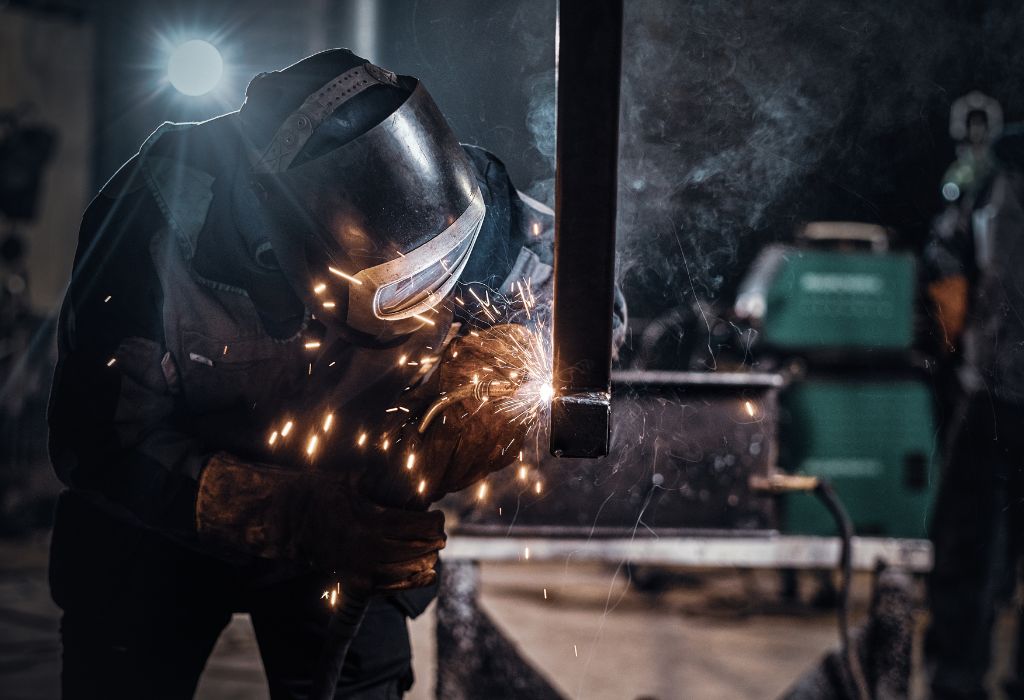Picture standing in a bustling workshop in Georgia, sparks flying as skilled welders join metal with precision.
Welding isn’t just a trade—it’s the backbone of industries like construction, automotive, and shipbuilding across the state.
Many people wonder how to turn their interest in this high-demand skill into a rewarding career.
The path to becoming a welder in Georgia can seem overwhelming at first.
With so many schools, certifications, and career options, it’s easy to feel lost about where to begin.
Yet, those who take the right steps can unlock well-paying jobs and long-term career stability.
Welding is one of the most accessible skilled trades. According to the U.S.
Bureau of Labor Statistics, welders earn a median annual wage of about $48,940, with top earners exceeding $63,000 depending on skill and location (BLS.gov).
Georgia, with its strong manufacturing and construction sectors, offers numerous opportunities for trained welders.
This guide will break down the process of becoming a welder in Georgia.
You’ll learn what welders do, which schools and programs to consider, the certifications required, job outlook, and how much you can earn.
Whether you’re starting from scratch or looking to upgrade your skills, the journey to welding success begins with the right knowledge and preparation.
By the end, you’ll have a clear roadmap to start your welding career in Georgia with confidence.
What Does a Welder Do?

A welder is a skilled tradesperson who fuses metal parts using heat, pressure, or specialized equipment. In Georgia, welders contribute to industries like construction, automotive, aerospace, and shipbuilding.
The job goes beyond simply melting and joining metal. Welders must read blueprints, follow strict safety standards, and choose the right technique for each project. Their work ensures that bridges, pipelines, vehicles, and machinery are safe and durable.
The day-to-day duties of a welder can vary. Some welders focus on precision TIG welding for aerospace components, while others perform heavy MIG welding on construction projects. Each setting requires unique skills and techniques.
Because welding is essential to so many industries, the demand for trained welders in Georgia continues to grow. Employers value those who combine technical expertise with attention to detail and safety.
What skills does a welder need?
Welders need manual dexterity, attention to detail, and knowledge of welding techniques and safety practices.
Is welding physically demanding?
Yes, it requires standing for long hours, lifting heavy materials, and working in challenging positions.
Do welders work indoors or outdoors?
Both. Some jobs are inside workshops, while others take place outdoors on construction or industrial sites.
What industries hire welders in Georgia?
Construction, automotive, aerospace, manufacturing, and shipbuilding.
Is welding considered a high-demand career?
Yes, due to ongoing infrastructure growth and manufacturing needs, welders remain in strong demand.
Educational Pathways to Become a Welder in Georgia
The first step toward a welding career in Georgia is completing the right education or training program. Aspiring welders can choose from vocational schools, community colleges, and apprenticeship opportunities. Each pathway provides hands-on training to build essential skills.
Most welding programs in Georgia last from six months to two years. Short certificate programs focus on specific welding techniques, while associate degrees provide more advanced training and theory. These options prepare students for certifications and immediate entry into the workforce.
Well-known institutions offering welding programs in Georgia include Gwinnett Technical College, Atlanta Technical College, and Chattahoochee Technical College. These schools are recognized for affordable tuition and strong job placement rates. Apprenticeship programs are also available, allowing students to earn while they learn.
A high school diploma or GED is usually required before enrolling in a welding program. Strong math and technical skills are also beneficial, as welders often need to interpret blueprints and measure materials accurately.
Do I need a high school diploma to start welding training in Georgia?
Yes, most welding programs require either a high school diploma or a GED.
Can I take online welding courses in Georgia?
Some theoretical lessons are online, but welding requires hands-on training in a workshop setting.
Which schools in Georgia offer welding training?
Options include Gwinnett Technical College, Atlanta Technical College, and Chattahoochee Technical College.
Are apprenticeships available in Georgia?
Yes, many unions and local companies provide apprenticeship programs where you can earn while learning.
How long does welding training take in Georgia?
Programs range from six months for certificates to two years for an associate degree.
Welding Certifications in Georgia
Certification is one of the most important steps in becoming a professional welder. While some entry-level jobs may not require certification, most employers in Georgia prefer or demand it. Certification proves your skills and increases your earning potential.
The American Welding Society (AWS) offers the most recognized certifications. These include the Certified Welder (CW) program, which tests practical welding ability, and advanced options like Certified Welding Inspector (CWI) and Certified Welding Educator (CWE). Many welding schools in Georgia prepare students directly for these exams.
The cost of certification tests usually ranges between $100 and $400, depending on the type and level. Most certifications are valid for several years and require renewal to stay active. By earning multiple certifications, welders can qualify for specialized, higher-paying jobs across the state.
Employers often prefer certified welders because it ensures consistency, quality, and adherence to safety standards. For those planning a long-term career, investing in certifications is one of the best decisions.
Do I need certification to work as a welder in Georgia?
Not always, but certifications improve job prospects and pay.
What are the most common certifications in Georgia?
The AWS Certified Welder program is the most widely recognized.
How much does welding certification cost?
Costs range from $100 to $400 depending on the exam type.
How long does certification last?
Most certifications last three to five years before renewal is needed.
Can I hold multiple certifications at once?
Yes, many welders pursue multiple AWS certifications to specialize and increase earnings.
Welding Jobs and Salaries in Georgia
Welding offers steady employment opportunities across Georgia. Skilled welders are needed in construction, manufacturing, shipbuilding, and automotive industries. Demand remains strong due to ongoing infrastructure projects and industrial growth.
The average salary for welders in Georgia ranges from $43,000 to $55,000 per year, depending on skill level, certification, and location. Specialized welders, such as pipe welders or TIG welders, often earn more. Urban areas like Atlanta generally provide higher wages than rural regions.
Many welding jobs also include overtime pay, shift differentials, and benefits such as health insurance and retirement plans. With experience and advanced certifications, welders in Georgia can earn salaries exceeding the national average.
Are welding jobs in demand in Georgia?
Yes, construction and manufacturing industries continue to drive strong demand for welders.
Do welders usually work full-time?
Most welders work full-time, though part-time and contract jobs are available.
Can welders earn overtime in Georgia?
Yes, overtime is common, especially in large industrial projects.
Does location affect welder salaries in Georgia?
Yes, urban areas typically offer higher pay compared to rural regions.
What benefits do welding jobs usually include?
Many employers provide health insurance, retirement plans, and paid leave.
Tips to Advance Your Welding Career in Georgia

Advancing in welding requires more than basic skills. Specialized training and certifications open doors to higher-paying positions and leadership roles. By investing in continuous learning, welders can significantly improve their career prospects.
Specializing in high-demand techniques such as TIG, MIG, or pipe welding can lead to jobs in industries that pay above the state average. Employers often prioritize candidates with advanced skills and proven expertise in specific areas.
Networking with professionals and joining welding unions in Georgia can also create opportunities. Unions provide training, apprenticeships, and access to better-paying jobs while offering workplace protections.
Exploring job boards, company websites, and union listings is essential for staying updated on opportunities. Welders who are willing to relocate within Georgia or take on specialized projects often earn higher wages.
Some welders eventually choose entrepreneurship by starting their own welding business. With proper licensing, tools, and industry connections, running a private welding service can be highly profitable.
Should I specialize in a particular type of welding?
Yes, focusing on high-demand techniques like pipe or TIG welding increases career opportunities.
Is joining a union helpful in Georgia?
Yes, unions provide training programs, job security, and higher wage opportunities.
How can I find welding jobs quickly?
Search job boards, union postings, and company websites for open positions.
Is relocation within Georgia necessary for advancement?
Sometimes, relocating to cities like Atlanta or Savannah can provide better pay and more options.
Can welders in Georgia start their own business?
Yes, with experience, proper licensing, and equipment, many welders run successful businesses.
Conclusion
Starting a welding career in Georgia is more achievable than many people think. With the right training, certification, and dedication, anyone can step into this in-demand trade and secure stable, well-paying work across multiple industries.
From construction sites to shipyards, welders are the backbone of Georgia’s growing economy. The need for skilled welders continues to rise, offering countless opportunities for those who commit to learning and mastering the craft. By choosing an accredited program, gaining AWS certification, and building hands-on experience, you set yourself apart in a competitive job market.
Career growth in welding doesn’t stop at entry-level positions. Specialized certifications, union memberships, and even entrepreneurial ventures can lead to higher earnings and long-term success. The more you invest in your skills, the greater the rewards you’ll enjoy.
If you’ve been considering a future in welding, now is the time to take action. Explore training programs near you, connect with apprenticeship opportunities, and start building the skills that Georgia employers value most. With determination and the right guidance, you can turn welding into not just a job, but a lasting and fulfilling career.

I’m Darrell Julian, the founder, lead writer, and hands-on welding enthusiast behind ArcWeldingPro.com. With more than 15 years of real-world welding experience, I created this platform to share what I’ve learned in the field, in the shop, and in the heat of the arc.


